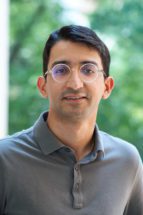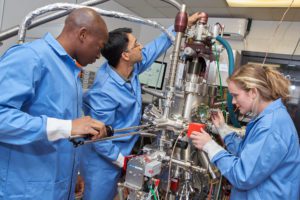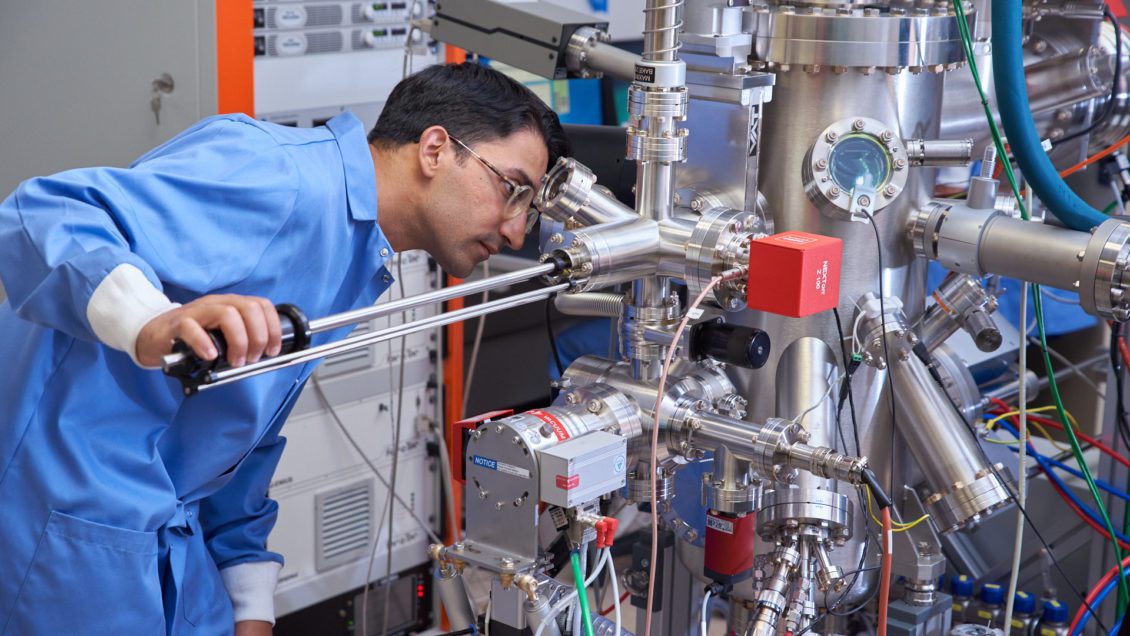Kasra Sardashti, an assistant professor in the College of Science’s Department of Physics and Astronomy, has received a 2022 Oak Ridge Associated Universities (ORAU) Ralph E. Powe Junior Faculty Enhancement Award.
Forty-one junior faculty from across the country received awards, which aim to enrich junior faculty’s research and professional growth.
Each winner receives $5,000 seed money for the 2022-23 academic year. Each recipient’s institution matches the Powe award with an additional $5,000. Winners may use the grants to purchase equipment, continue research or travel to professional meetings and conferences.
The award will support Sardashti’s research in superconducting quantum computing devices.
Talent and potential

“I am thrilled Dr. Sardashti earned this very prestigious and competitive award. It recognizes his immense talent and potential to emerge as a leader in his field. This award will allow him to continue to expand his very productive research program,” said Sean Brittain, chair of the Department of Physics and Astronomy. “I look forward to seeing the valuable contributions he’ll make to the field of quantum computing.”
Quantum computers could revolutionize the future of science and technology by solving extremely complex problems beyond the reach of even the best current classical computers.
By leveraging two key quantum phenomena — superposition and entanglement — quantum computers can explore multiple solution pathways simultaneously, allowing them to solve problems that would take a traditional computer too long to calculate.
Sardashti, who has a joint appointment as an assistant professor of electrical and computer engineering in the Clemson College of Engineering, Computing and Applied Sciences, will use the award to design and fabricate simple Josephson Junction switches on germanium for superconducting qubit systems, he said.
Scaling challenge

He said that one issue with today’s quantum computers is scaling the number of qubits.
Semiconductor processors in traditional computers and phones have billions of transistors, which are binary switches that either prevent or allow current to flow through. In quantum computers, it is challenging to put several of the individual processing units, or qubits, together while preventing unwanted crosstalk between them.
“The record is 127, but to make a useful computer, we must go to at least tens of thousands. To get there, one issue you have to address is if these little processing units are not supposed to talk to each other, they don’t talk to each other. You have to control their interaction,” Sardashti said. “The switch we’re proposing is a way to make this possible to put a lot of these processing units on the same chip in an energy-efficient way while being able to control the interaction between the various qubits on demand.”
Powe Award recipients are in the first two years of a tenure track position and work in any of five science and technology disciplines:
- Engineering and applied science
- Life sciences
- Mathematics and computer science
- Physical sciences
- Policy, management, or education
The awards are named for Ralph E. Powe, who served as the ORAU councilor from Mississippi State University for 16 years. Powe participated in many committees and special projects during his tenure and was elected chair of ORAU’s Council of Sponsoring Institutes. He died in 1996.
Furthering research
Ken Tobin, ORAU vice president for research and university partnerships, said the award program provides an opportunity for junior faculty members to further their research careers and pursue new funding avenues.
Sardashti joined Clemson in 2021. He helped organize the first South Carolina Quantum Technology Forumin April, bringing academic and industrial quantum computing, sensing and communication experts together on the Clemson campus.
“I’m honored to be chosen for this award and that somebody saw potential in this project and our group to get this work done,” he said.
The College of Science pursues excellence in scientific discovery, learning, and engagement that is both locally relevant and globally impactful. The life, physical, and mathematical sciences converge to tackle some of tomorrow’s scientific challenges, and our faculty are preparing the next generation of leading scientists. The College of Science offers high-impact transformational experiences such as research, internships, and study abroad to help prepare our graduates for top industries, graduate programs, and health professions. clemson.edu/science
Get in touch and we will connect you with the author or another expert.
Or email us at news@clemson.edu

